Modern businesses often expand beyond a single entity, forming dynamic multi company ecosystems where multiple units collaborate under one corporate framework. Odoo multi-company functionality delivers unmatched value, providing the digital backbone for organizations – from regional multi-store businesses to global multicorporation. This flexibility empowers multi-business companies and inter-firm groups to operate as a unified system while preserving each Odoo company’s autonomy. For enterprises managed by entities across regions, this balance of independence and centralization drives sustainable growth.
Odoo 18, a robust ERP platform, is engineered to manage multi company operations within a single, unified system. Whether you’re running a multi-business company with diverse product lines, overseeing intercompany holdings, or managing Odoo companies across borders, Odoo’s multi company tools centralize processes, ensure compliance, and enhance collaboration. Seamlessly align accounting, sales, purchasing, inventory, HR, and CRM across all entities while retaining company-specific configurations, such as local tax rules or financial charts of accounts.
In multi company setups, terms like “multi companies” or “multiple company” may arise, but in Odoo 18, they all refer to managing multiple Odoo companies within one environment. For global brands, regional groups, or multicorporation models, Odoo’s multi company functionality enables resource coordination, standardized workflows, and integrated operations—driving growth, ensuring compliance, and empowering strategic decision-making.
Unified
Control for Odoo Multi-Company
Operations
Implementing an Odoo multi company system delivers strategic advantages for businesses managing several companies, subsidiaries, or diverse business units. Whether operating as a multi business company, a multi-stores corporation, or even a large multicorporation, the multi company structure in Odoo 18 provides the tools to streamline operations, maintain compliance, and scale efficiently. With multi company in Odoo 18, organizations can centralize control, enhance inter-company workflows, and support global growth without losing operational flexibility. As a result, Odoo multi-company features enable transparent financial consolidation, cross-company resource sharing, and unified reporting across all Odoo companies. This makes the platform effective for inter company holdings, fast-growing multi-business companies, and even international models like multi corporation.
Centralized Management of Odoo Multi-Company Systems
Odoo 18 allows complete centralization of key operations across multiple company entities within a single platform. Instead of running separate systems for each Odoo company, all Odoo companies share a unified database. This makes it possible to access shared data, such as products, customers, and suppliers — while preserving company-specific records like financial and inventory. Centralized management in a multi company Odoo setup ensures standardized workflows for accounting, sales, procurement, and more, reducing errors and improving efficiency.
Enhanced
Inter-Company Collaboration
With Odoo multi-company automation, transactions between Odoo multiple companies become seamless. For example, when one Odoo company sells goods to another within the same environment, intercompany Odoo automatically generates the corresponding journal entries. This eliminates manual reconciliation and ensures accurate records. Resources such as product catalogs, vendor lists, and employee databases can be shared across multi companies, reducing duplication and maintaining consistency. Role-based permissions further secure data while enabling collaboration across the multi company structure.
Scalability
for Growing Multicorporation
The multi company framework in Odoo 18 is built for growth, allowing new companies to be added without disrupting existing operations. This makes it ideal for businesses expanding into new markets, launching additional branches, or restructuring as a multi corporation Singapore–style holding. The system supports region-specific tax and accounting rules, enabling compliance in different jurisdictions. By consolidating operations into one system, organizations avoid multiple software licenses, lower costs, and maintain a scalable foundation suitable for both a multi business company and a large multicorporation.
Improved
Financial Management for Multi-Company Structures
Odoo multi-company capabilities simplify financial oversight for complex structures like inter firma groups or multi store corporations. Businesses can create consolidated reports — including balance sheets, P&L statements, and cash flow reports. Multi-currency support with automatic exchange rate updates ensures accurate tracking for several companies operating internationally. Tax rules can be configured per Odoo company, streamlining calculations and ensuring compliance while maintaining clarity in the multi company environment.
Increased
Operational Efficiency
Inventory management in a multi company Odoo setup is unified yet flexible. Businesses can track stock across multi companies with options to share warehouses or maintain separate inventories. Repetitive processes such as invoicing, payroll, and order processing are automated across Odoo multiple companies, freeing up resources for strategic initiatives. Customizable dashboards provide real-time visibility into each Odoo company’s KPIs, improving decision-making.
Seamless
Multicorporation Experience
Users can switch between Odoo companies without logging out, creating an uninterrupted workflow for employees managing several companies. The consistent interface across all entities minimizes the learning curve. With the Odoo 18 mobile app, managers can access multi company CRM data anywhere, ensuring flexibility and responsiveness for multi business companies operating in dynamic markets.
How To Enable and
Configure Odoo Multi Company
In practice, Odoo multi-company setup enables businesses to seamlessly integrate all their units into a single, streamlined system, empowering efficient management and growth. This capability allows Odoo companies to automate intercompany Odoo workflows such as cross-company sales, purchases, and accounting entries, eliminating manual reconciliations. With these settings in place, your multi business company can leverage the full potential of Odoo multi-company management, ensuring seamless collaboration and operational consistency across all entities, from small multi-stores corporations to global multicorporation. Once this step is complete, businesses can activate the Managed Companies option, which provides a centralized view for overseeing multiple company environments from a single interface.
- To begin the configuration,
open the Settings menu, go to the Companies section, and
enable the Inter-Company Transactions feature and configure it according to your needs.
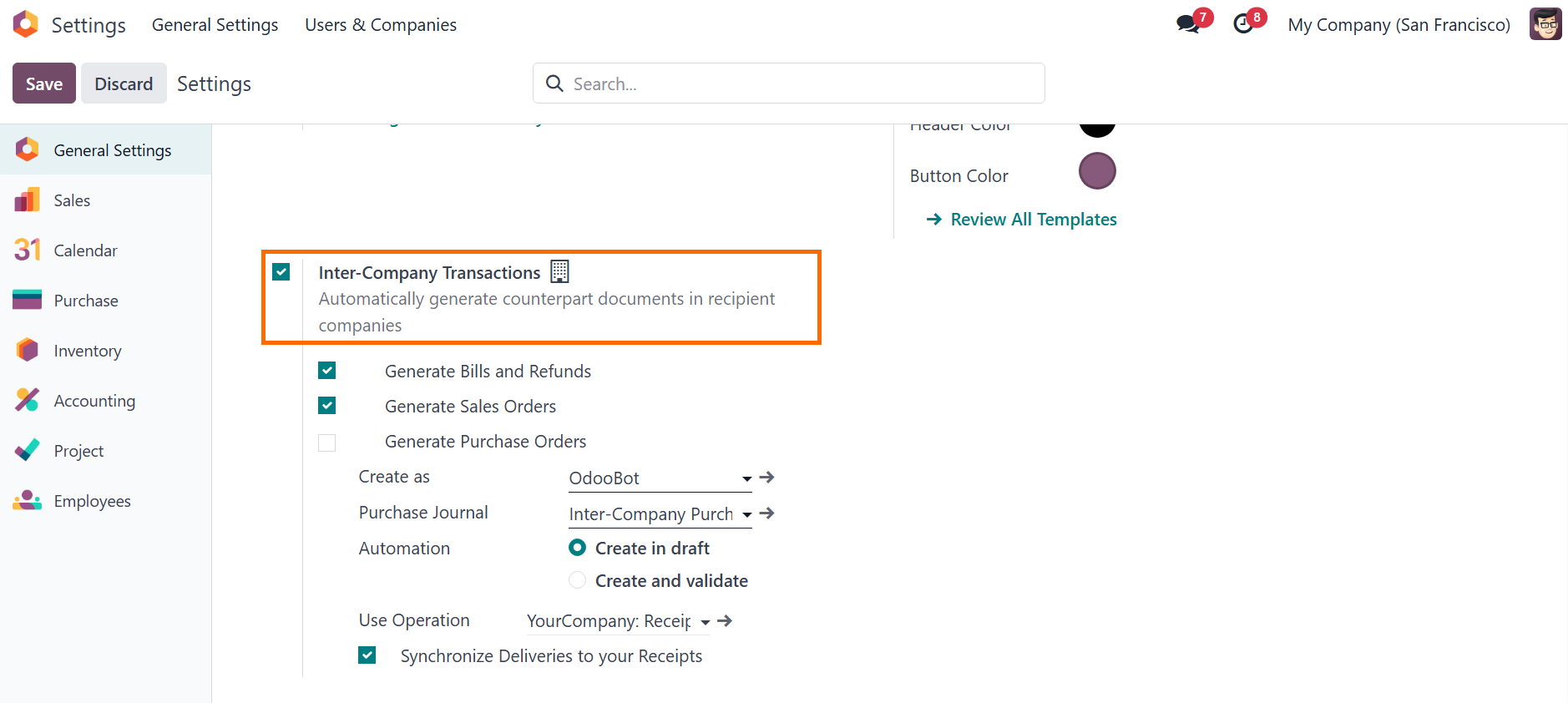
- Next,
scroll up to activate the Managed Companies option — a core multi company
tool that lets you oversee several companies from one centralized interface.
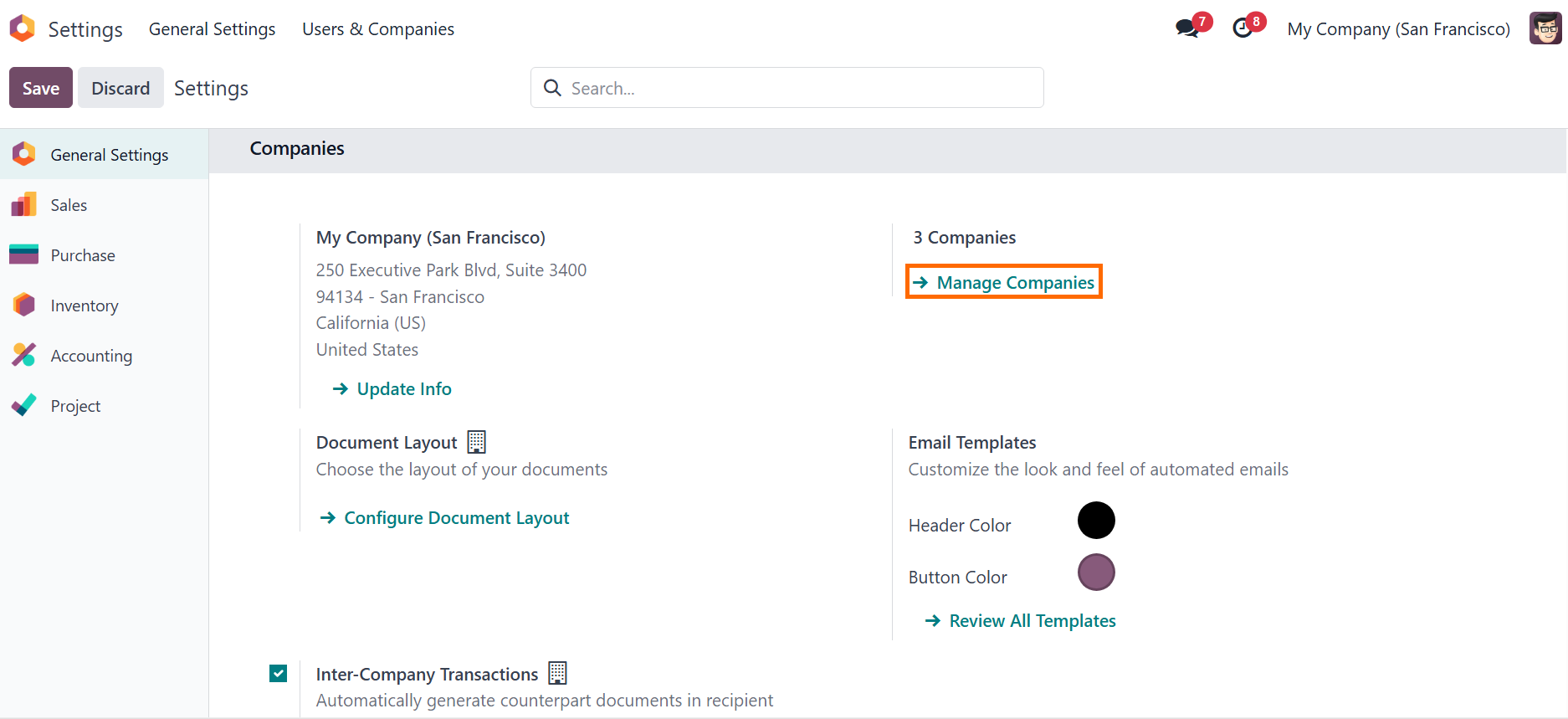
Multi Company Accounting in the Odoo Dashboard
Once the configuration of an Intercompany Purchase Journal is complete, the dedicated journal card immediately appears on the Accounting Dashboard in Odoo 18. This provides accountants and managers with a clear view of all inter-company purchases, separate from regular supplier invoices. Instead of manually filtering through thousands of purchase entries, the accounting dashboard highlights intercompany Odoo features as a distinct flow. In simple terms, an Inter-Company Journal is a dedicated account Odoo creates specifically to record and track transactions between your companies — keeping them clearly separated from standard vendor purchases. Managers can monitor outstanding bills, track payments, and ensure compliance across several companies within a unified Odoo 18 environment. In practice, finance teams can consolidate reports more accurately, reduce errors in intercompany Odoo eliminations, and maintain a structured multi company accounting process that scales with business growth.
- Navigate to the Accounting module, and on the main dashboard, the Inter-Company Purchase Journal card is displayed.
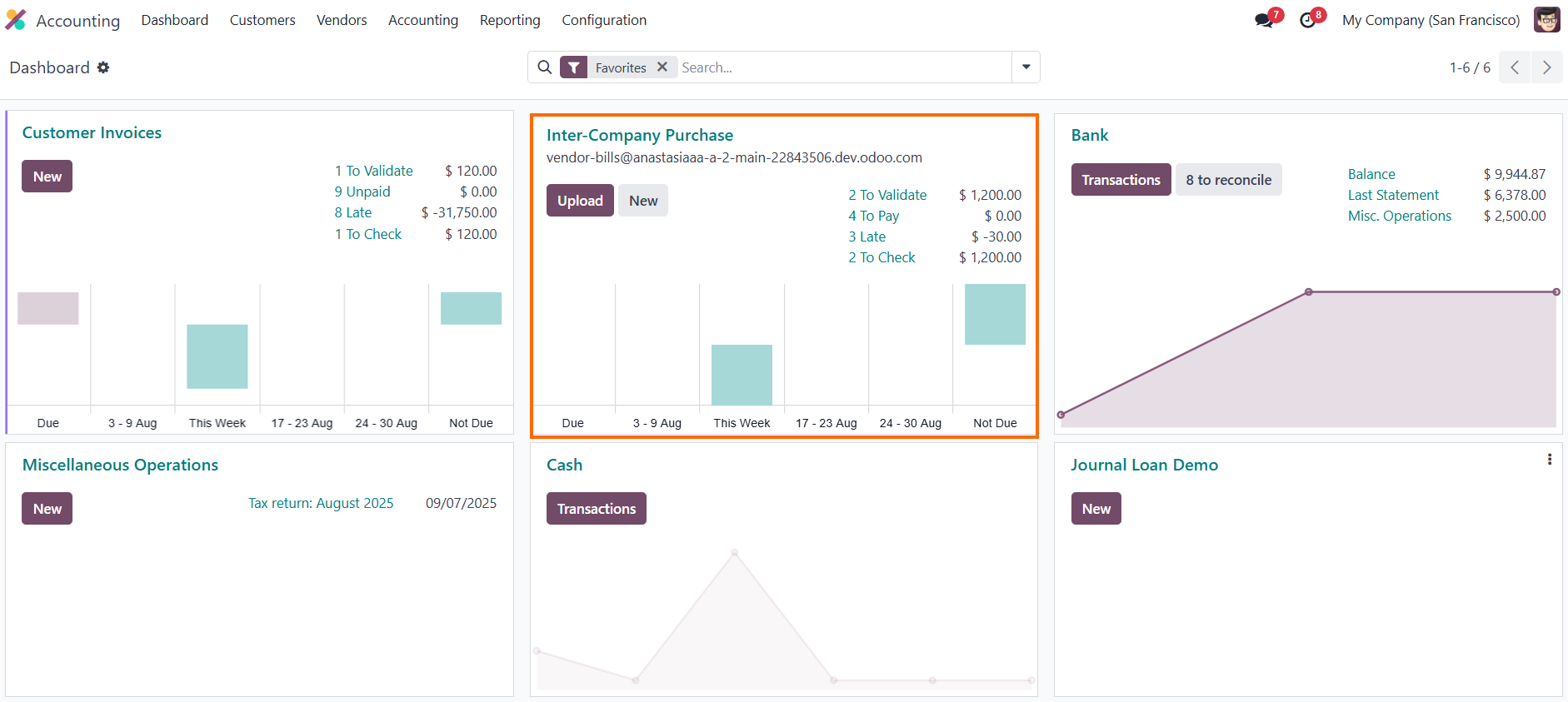
Select Upload to attach inter-company invoices, contracts, or other supporting documents,
ensuring proper traceability within the Accounting dashboard.
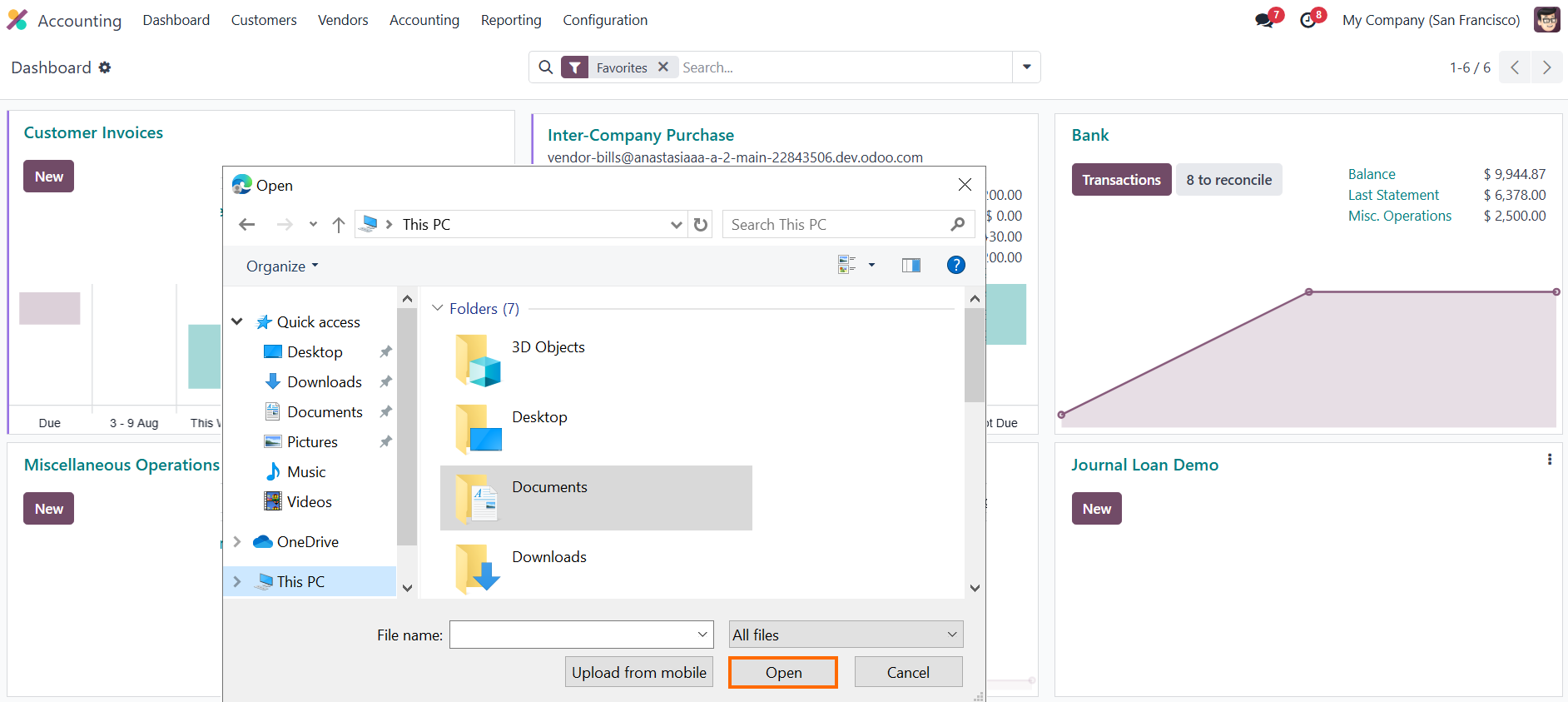
Security and Access Rights in Multi Company Odoo
Security is the cornerstone of managing multiple companies in Odoo, as every transaction and report depends on controlled access to sensitive information. Managing several companies within a single ERP requires strict access rules to protect sensitive data. In a multi company Odoo structure, administrators can configure security policies that define exactly what each user can see and do across Odoo companies. This layered security ensures compliance, protects financial integrity, and maintains transparency between intercompany Odoo workflows. By granting role-based access, businesses running several companies or inter company holdings can ensure that sensitive records remain private while still enabling cross-company collaboration. For example, an accountant may only access the ledgers of their own Odoo company, while group-level managers can consolidate reports across multiple company environments.
- Open a user profile and scroll down to the Allowed Companies section. Select one or more Odoo companies that this user should be able to access.
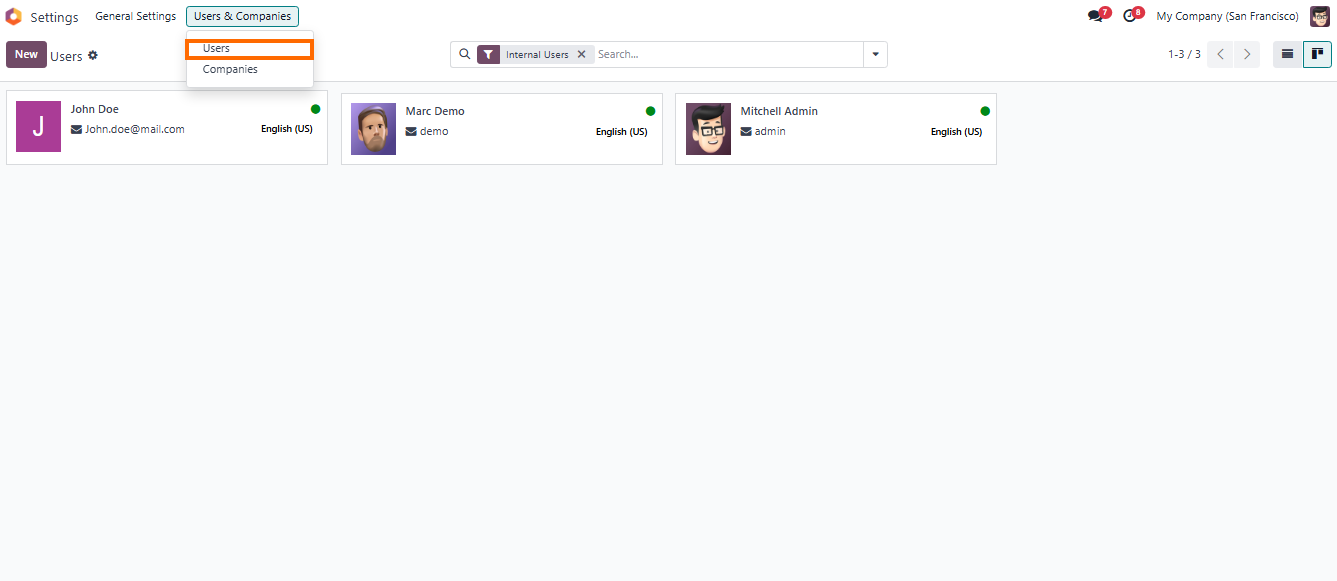
- Open a user profile and scroll down to the Allowed Companies section. Select one or more Odoo companies that this user should be able to access.
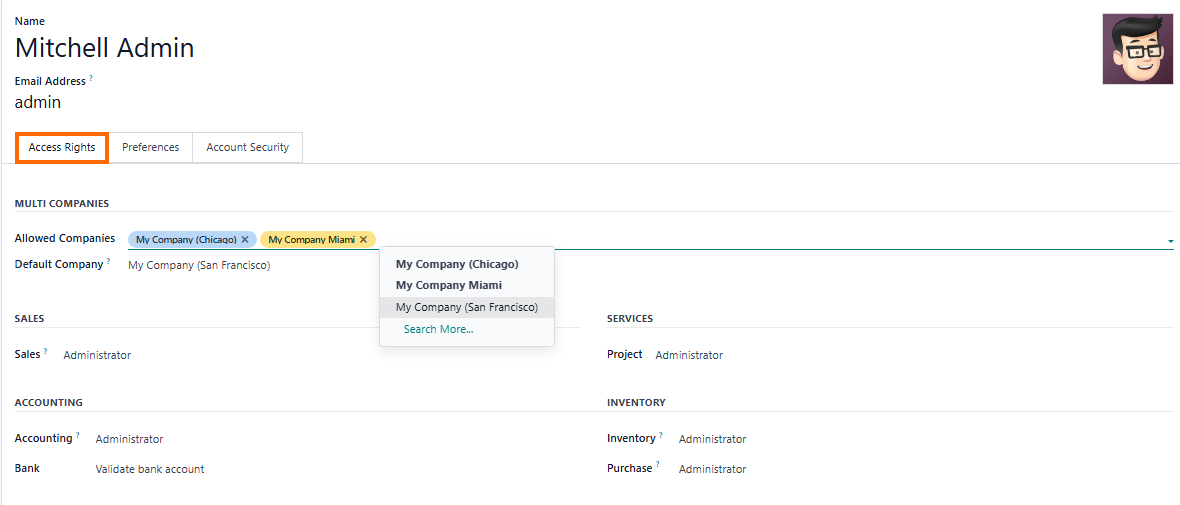
Managing Companies with Odoo Intercompany
Management
Take control of your growing business n with Odoo’s seamless multi company solution. Unlock the power of Odoo multi-company setup to effortlessly manage multiple business units under one robust platform. In a multi company structure, accurate configuration of each Odoo company is the foundation for smooth collaboration across multiple Odoo companies. This makes it possible for multiple companies under one system to function independently but still integrate seamlessly in business units. As a result, businesses can coordinate resources across Odoo companies, optimize multi company processes, and support sustainable growth in a multi company. By managing each company’s profile, enterprises ensure compliance, accurate reporting, and readiness for intercompany transactions.
- Click
Users & Companies, and select Companies. Select the Odoo company you want to
configure — for example, the Chicago Company.
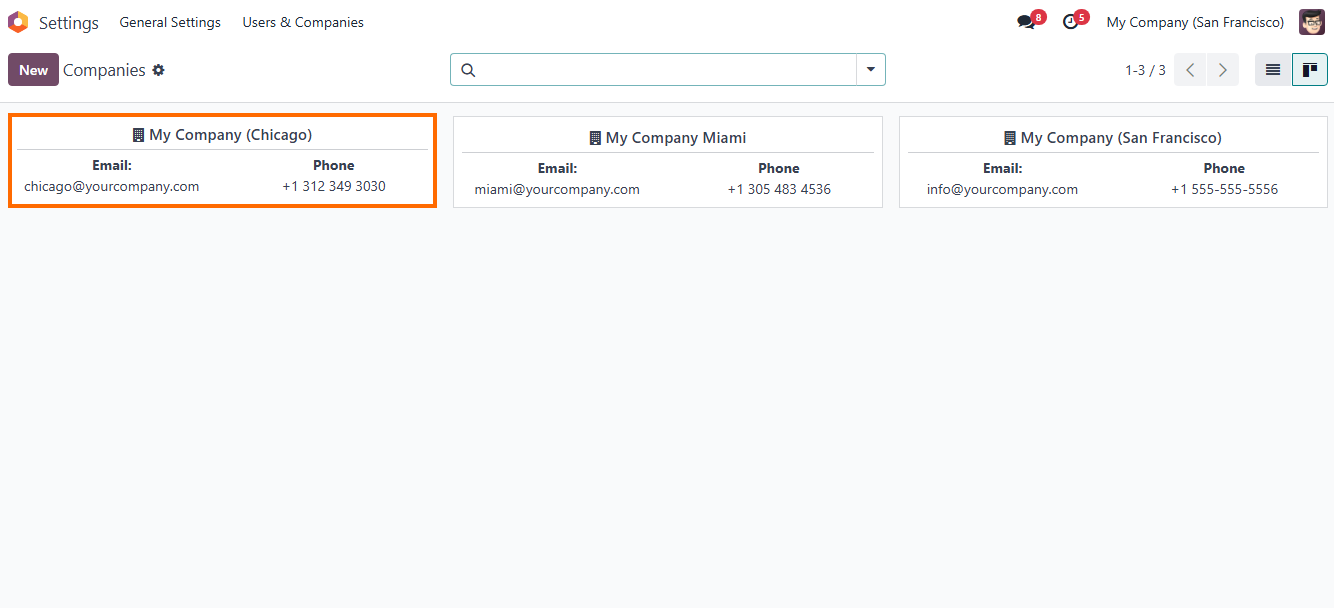
-
Manage your company data, choose currency and add contact
details for quick access, as
shown in the screenshot.
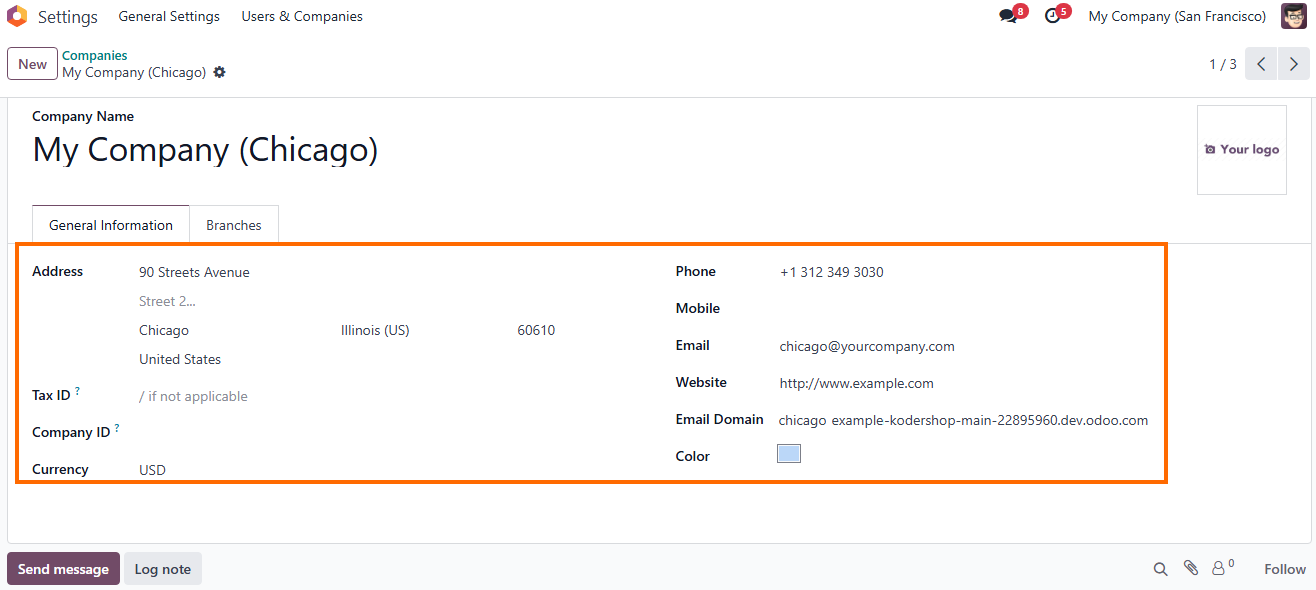
Practical Examples of Multi Company
Transactions in Odoo 18
After completing all the necessary configurations in your Odoo multi-company setup, the system is ready to handle seamless intercompany transactions across multiple company entities. For instance, consider a multi business company with branches in different cities, such as a Chicago-based company selling inventory to a San Francisco company. In this scenario, Odoo multi-company automation ensures that when the sale is initiated from the Chicago branch, the corresponding purchase order is automatically generated in the San Francisco branch's system. This eliminates manual data entry, reduces errors, and maintains accurate records across Odoo multiple companies. Whether you're managing a small multi-stores corporation or a large multicorporation, these automated workflows support efficient resource allocation and financial transparency in the multi company Odoo 18.
- From the top-right corner of the interface, click My Company and select Odoo company. This allows you to manage operations specific to this entity within the multi company.
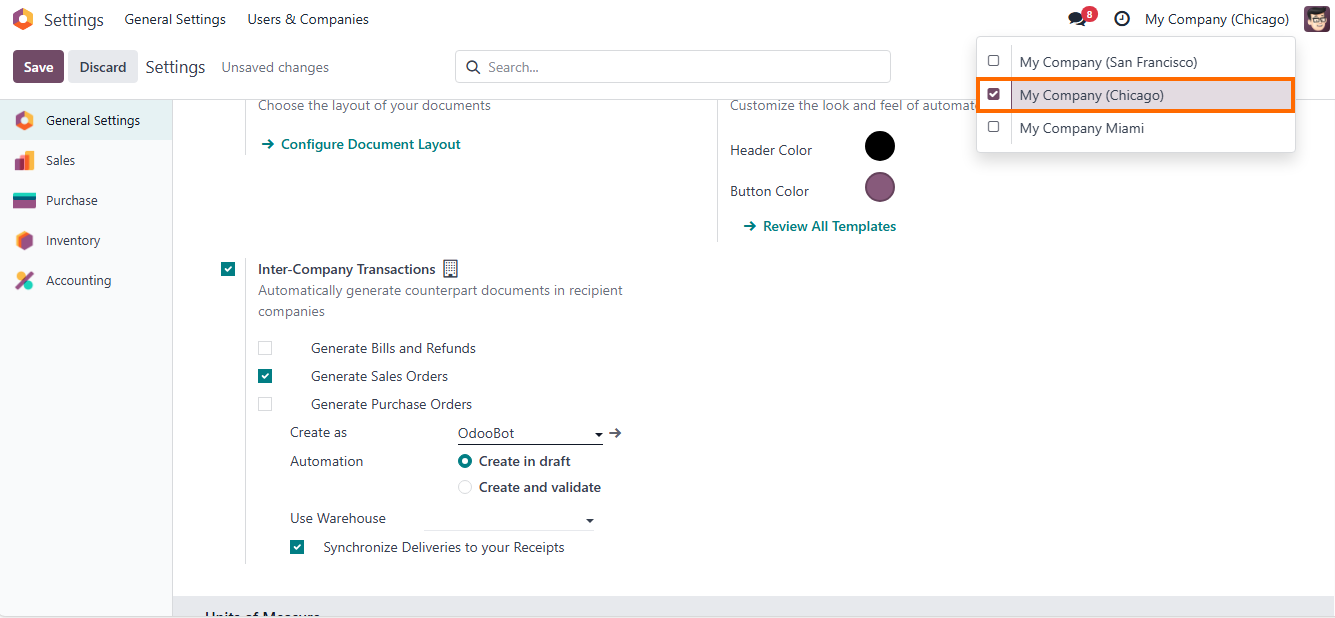
If the Chicago branch is selling to the San Francisco branch, enable the intercompany feature
by checking the box next to both Odoo companies and click Confirm.
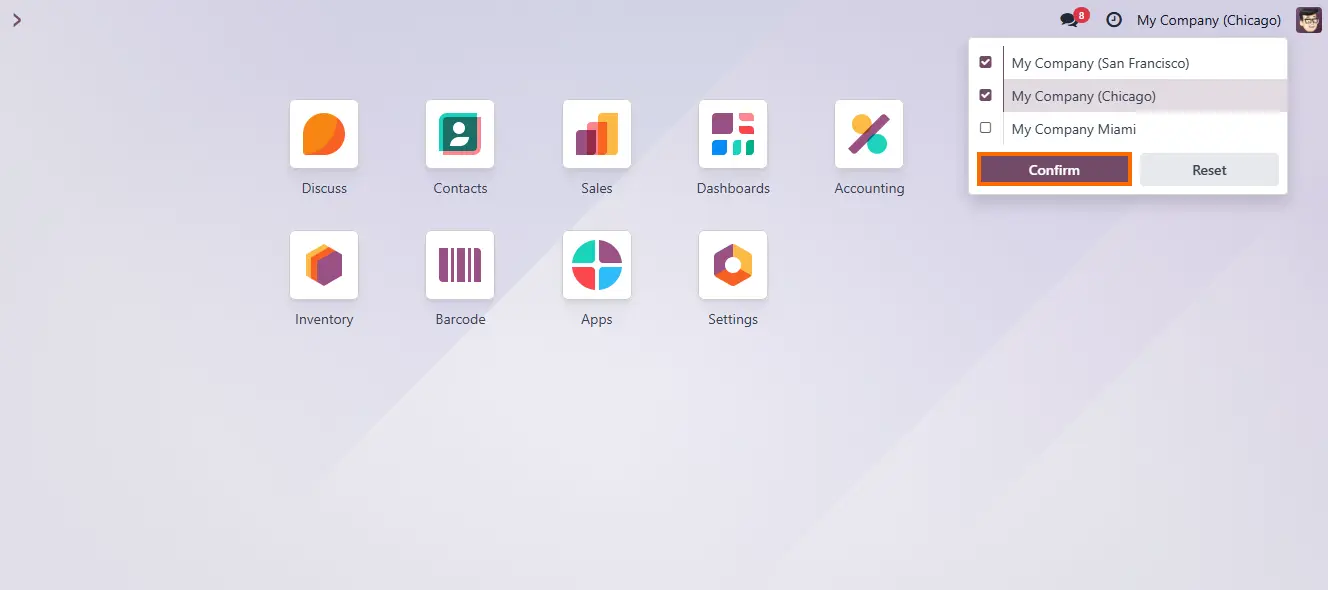
- Create a quotation for the intercompany transaction. Odoo’s multi company CRM tools automatically sync relevant data, such as product details and pricing, between the Odoo companies involved.
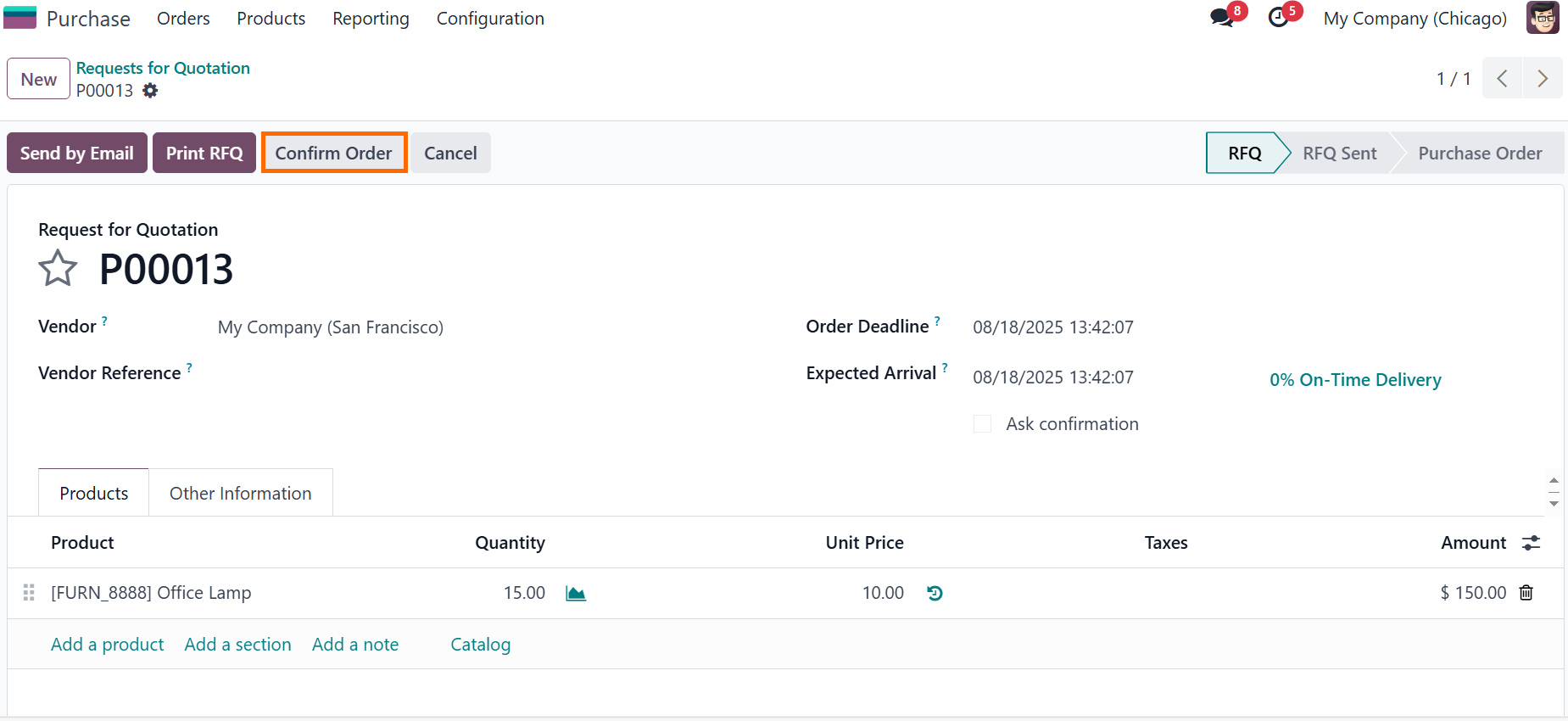
- Odoo 18’s intercompany automation generates corresponding journal entries in both Odoo companies ledgers, ensuring accurate financial tracking within the multi company structure.
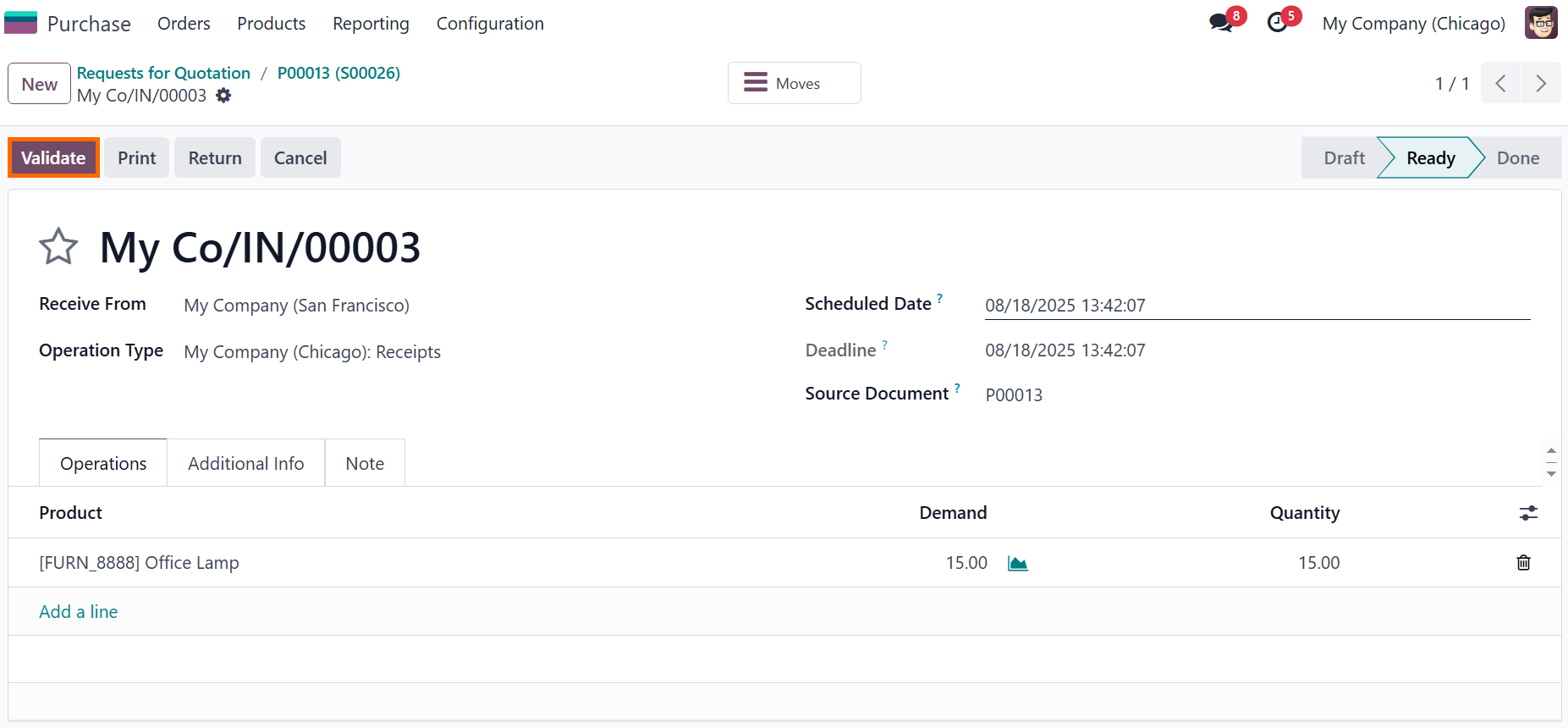
- By clicking the Print button in the Sales or Inventory module, Odoo automatically generates an invoice for the inter-company transaction, displaying all relevant details in PDF format.
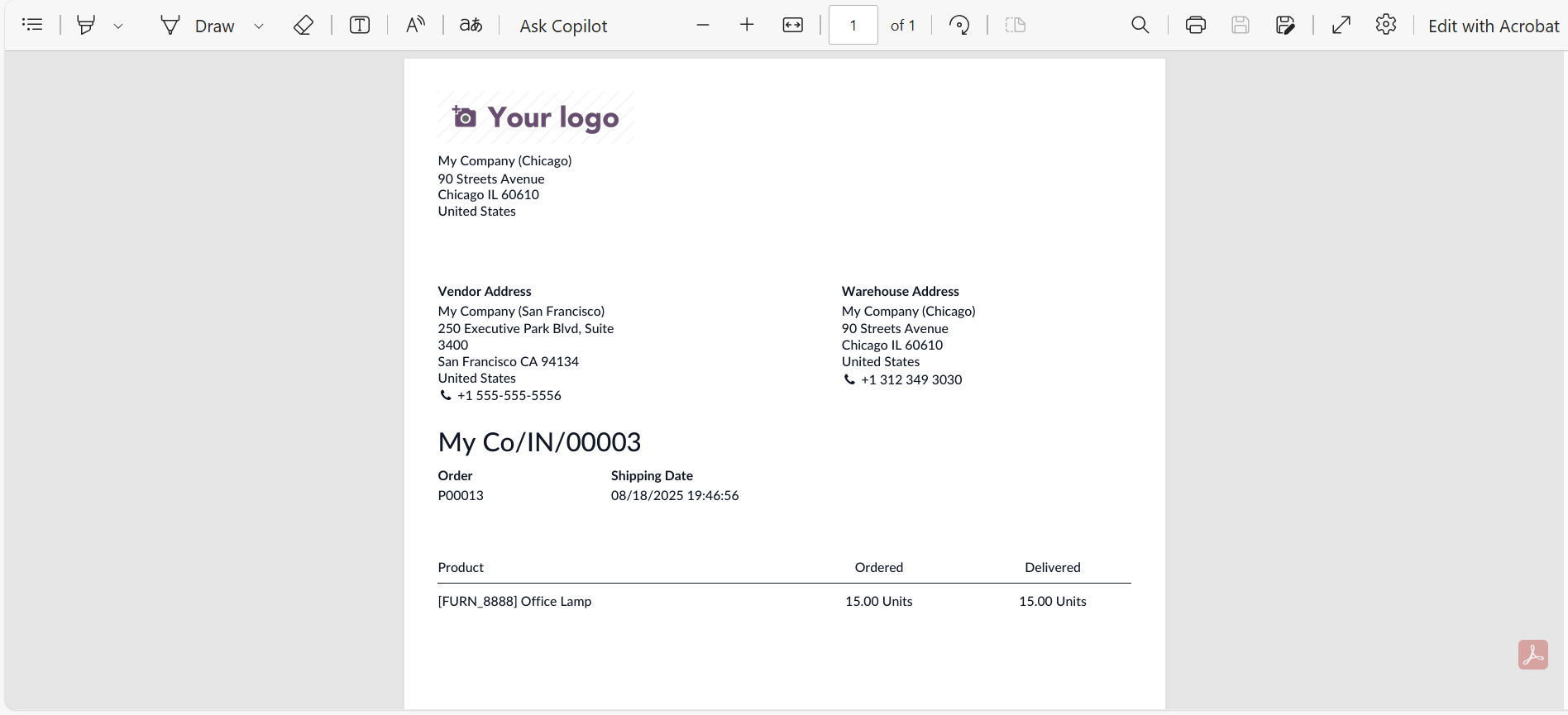
Mobile Access for Odoo Multi-Company Management
The Odoo 18 mobile app empowers multi company operations by enabling real-time management across company entities, such as Odoo companies in San Francisco, Chicago and, Miami. For example, a manager overseeing a multi business company can use the app to monitor intercompany Odoo transactions, like a sale from a Chicago company to San Francisco company, or approve inventory transfers to Miami, all from a mobile device. Odoo multi company feature supports seamless switching between companies, ensuring uninterrupted workflows for multi companies. Real-time notifications provide updates on multi company CRM activities or financial transactions, enhancing decision-making for multi-corporations. Whether managing a multi-stores corporation or a larger multicorporation, the Odoo multi-company mobile app ensures multi company in Odoo processes remain efficient, accessible, and transparent across all Odoo companies in dynamic business.
- This mobile access reduces response times by allowing instant approvals and data access, streamlining operations across multi-stores corporations or larger multicorporation.
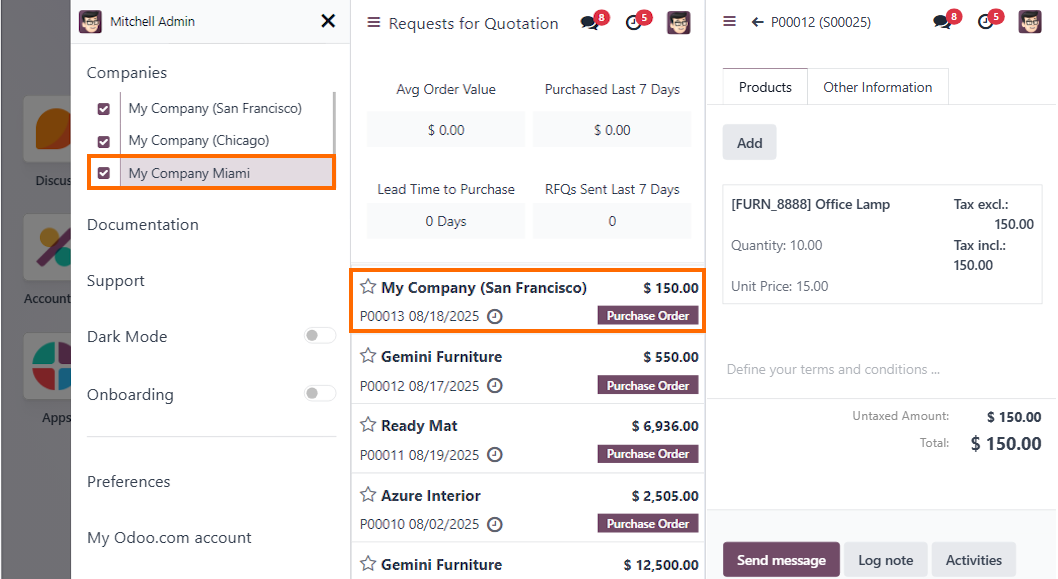
Benefits of Odoo Multi-Company
Functionality
Odoo multi-company features transform the way businesses manage complex, multi-entity operations, delivering efficiency, scalability, and seamless collaboration. From automating Odoo multi-company transactions to centralizing financial reporting and CRM, Odoo 18 empowers organizations to unify processes while preserving each company’s autonomy. By enabling real-time data sharing and automated workflows across Odoo companies, these features reduce operational costs and enhance decision-making for multibusiness companies. The following case studies will show how businesses – ranging from multi-store corporations to global multiorporations – leverage Odoo 18 to reduce costs, boost accuracy, and drive sustainable growth across diverse markets. With multi company features, companies unlock a competitive edge by streamlining operations and scaling effortlessly.
Case Study 1: Automating Sales Between Multiple Odoo Companies
One global multi business company faced issues with manual reconciliation when several Odoo companies exchanged goods internally. By configuring Odoo multi-company automation, each sale from one Odoo company instantly created a purchase order in the partner entity. This eliminated errors and streamlined processes in a multi company structure. Order processing time was reduced by 65%, and accounting accuracy improved significantly across all multi companies.
Case Study 2: Financial Consolidation for a Multicorporation
A European multicorporation operating in three countries struggled with fragmented accounting across multiple companies. After implementing Odoo multi company accounting features, the group gained real-time consolidated balance sheets and profit-and-loss reports. Multi-company in Odoo 18 ensured compliance with local tax rules while unifying reporting for inter company holdings. Auditing costs dropped by 40%, and monthly reporting was completed twice as fast.
Case Study 3: Multi Company CRM for
Cross-Border Expansion
An expanding multi corporation Singapore holding had difficulties managing customer data across multiple company divisions. By deploying multi company tools, customer records were centralized while each Odoo company maintained its own local teams and workflows. This allowed sales departments in multi business companies to collaborate without data duplication. Lead-to-deal conversion increased by 25%, and customer response time decreased by 30%.
Case Study 4: Inventory Integration in a Multi Stores Corporation
A multi-stores corporation with warehouses managed by different Odoo companies needed better inventory visibility. Using Odoo multiple companies inventory features, stock levels were shared across locations, enabling smooth internal transfers and efficient restocking. This flexible multi company Odoo setup supported both shared and separate warehouses.
Logistics costs fell by 18%, while product
availability across all stores improved by 20%.
Case Study 5: Streamlined Operations for Inter-Firm Groups
One inter-firm group managing multiple companies across industries used to maintain separate ERPs. By migrating to Odoo multi-company, they unified sales, HR, and procurement processes while respecting local compliance. The new multi-company in Odoo 18 model improved collaboration and allowed scaling without new licenses for every entity. Operational efficiency rose by 30%, and IT maintenance costs dropped by 25% across the a multiple company environment.
Conclusion
Managing a business that spans multiple companies is no longer a challenge with Odoo Multi Company features. It’s advanced multi company framework centralizes data, automates intercompany Odoo processes, and ensures compliance across borders. Whether an organization operates as a regional multi-stores corporation, a global multicorporation, or an inter-company group, Odoo 18 provides the flexibility to unify operations while respecting the autonomy of each Odoo company.
For growing enterprises, the ability to oversee multiple company entities within one ERP environment unlocks efficiency and strategic clarity. With Odoo multi-company functionality, CFOs and managers gain real-time visibility into sales, accounting, inventory, and CRM across all Odoo companies. This eliminates duplication, reduces reconciliation errors, and streamlines financial reporting, ensuring accuracy for both multi business companies and complex inter company holdings.
As a result, by standardizing workflows across multi companies, businesses can scale faster, integrate acquisitions seamlessly, and optimize shared resource. The platform adapts to unique tax regulations, financial practices, and operational needs while maintaining a unified database. For modern multi companies, this balance is the key to sustainable growth, operational excellence, and lasting competitiveness.
Ready to streamline your multi company management with Odoo 18? Contact us to discuss how we can help unify your operations and accelerate growth.